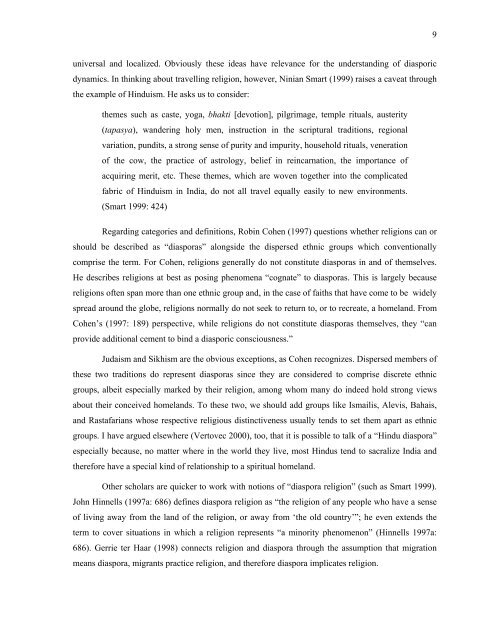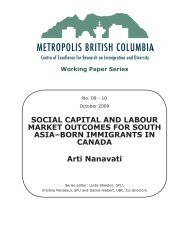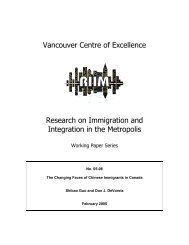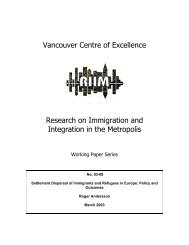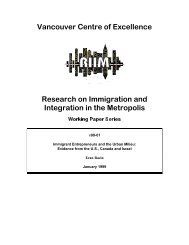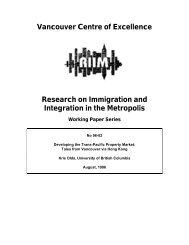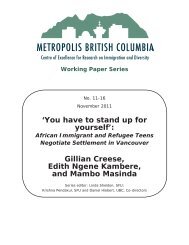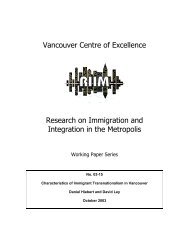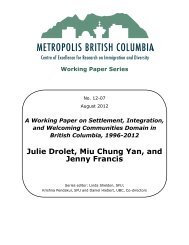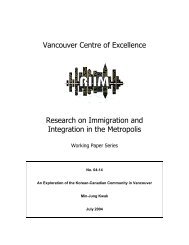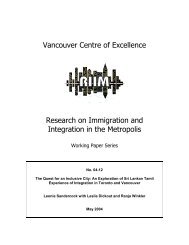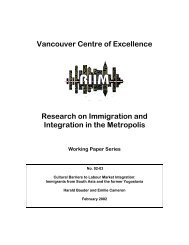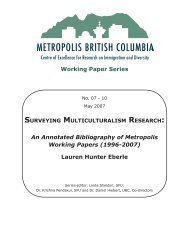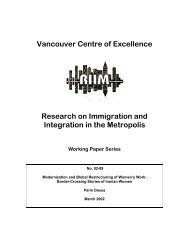Religion in Migration, Diasporas and Transnationalism - Metropolis BC
Religion in Migration, Diasporas and Transnationalism - Metropolis BC
Religion in Migration, Diasporas and Transnationalism - Metropolis BC
You also want an ePaper? Increase the reach of your titles
YUMPU automatically turns print PDFs into web optimized ePapers that Google loves.
9<br />
universal <strong>and</strong> localized. Obviously these ideas have relevance for the underst<strong>and</strong><strong>in</strong>g of diasporic<br />
dynamics. In th<strong>in</strong>k<strong>in</strong>g about travell<strong>in</strong>g religion, however, N<strong>in</strong>ian Smart (1999) raises a caveat through<br />
the example of H<strong>in</strong>duism. He asks us to consider:<br />
themes such as caste, yoga, bhakti [devotion], pilgrimage, temple rituals, austerity<br />
(tapasya), w<strong>and</strong>er<strong>in</strong>g holy men, <strong>in</strong>struction <strong>in</strong> the scriptural traditions, regional<br />
variation, pundits, a strong sense of purity <strong>and</strong> impurity, household rituals, veneration<br />
of the cow, the practice of astrology, belief <strong>in</strong> re<strong>in</strong>carnation, the importance of<br />
acquir<strong>in</strong>g merit, etc. These themes, which are woven together <strong>in</strong>to the complicated<br />
fabric of H<strong>in</strong>duism <strong>in</strong> India, do not all travel equally easily to new environments.<br />
(Smart 1999: 424)<br />
Regard<strong>in</strong>g categories <strong>and</strong> def<strong>in</strong>itions, Rob<strong>in</strong> Cohen (1997) questions whether religions can or<br />
should be described as “diasporas” alongside the dispersed ethnic groups which conventionally<br />
comprise the term. For Cohen, religions generally do not constitute diasporas <strong>in</strong> <strong>and</strong> of themselves.<br />
He describes religions at best as pos<strong>in</strong>g phenomena “cognate” to diasporas. This is largely because<br />
religions often span more than one ethnic group <strong>and</strong>, <strong>in</strong> the case of faiths that have come to be widely<br />
spread around the globe, religions normally do not seek to return to, or to recreate, a homel<strong>and</strong>. From<br />
Cohen’s (1997: 189) perspective, while religions do not constitute diasporas themselves, they “can<br />
provide additional cement to b<strong>in</strong>d a diasporic consciousness.”<br />
Judaism <strong>and</strong> Sikhism are the obvious exceptions, as Cohen recognizes. Dispersed members of<br />
these two traditions do represent diasporas s<strong>in</strong>ce they are considered to comprise discrete ethnic<br />
groups, albeit especially marked by their religion, among whom many do <strong>in</strong>deed hold strong views<br />
about their conceived homel<strong>and</strong>s. To these two, we should add groups like Ismailis, Alevis, Bahais,<br />
<strong>and</strong> Rastafarians whose respective religious dist<strong>in</strong>ctiveness usually tends to set them apart as ethnic<br />
groups. I have argued elsewhere (Vertovec 2000), too, that it is possible to talk of a “H<strong>in</strong>du diaspora”<br />
especially because, no matter where <strong>in</strong> the world they live, most H<strong>in</strong>dus tend to sacralize India <strong>and</strong><br />
therefore have a special k<strong>in</strong>d of relationship to a spiritual homel<strong>and</strong>.<br />
Other scholars are quicker to work with notions of “diaspora religion” (such as Smart 1999).<br />
John H<strong>in</strong>nells (1997a: 686) def<strong>in</strong>es diaspora religion as “the religion of any people who have a sense<br />
of liv<strong>in</strong>g away from the l<strong>and</strong> of the religion, or away from ‘the old country’”; he even extends the<br />
term to cover situations <strong>in</strong> which a religion represents “a m<strong>in</strong>ority phenomenon” (H<strong>in</strong>nells 1997a:<br />
686). Gerrie ter Haar (1998) connects religion <strong>and</strong> diaspora through the assumption that migration<br />
means diaspora, migrants practice religion, <strong>and</strong> therefore diaspora implicates religion.


